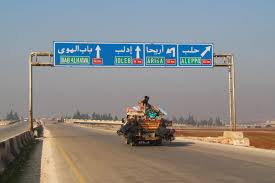The Idlib Governorate in northwest Syria has awarded $12 million in contracts to Al-Raqi Construction and Investment Company for the rehabilitation of strategic road networks—a move that has reignited concerns over the rise of a new economic elite monopolizing post-conflict reconstruction. Critics draw parallels to Rami Makhlouf’s empire under Bashar al-Assad, warning that former Hay’at Tahrir al-Sham (HTS) figures are now replicating this model in opposition-held territories.
The Controversial Figure Behind Al-Raqi
Al-Raqi is led by Abdul Rahman Salama (“Abu Ibrahim”), a former senior HTS commander who once served as the group’s “Emir of Aleppo” during the opposition’s control of eastern Aleppo (2012–2016). After transitioning from military to economic leadership, Salama founded Al-Raqi in 2020 and has since expanded its influence, securing nearly all major housing and infrastructure projects in HTS-controlled areas.
Salama’s political clout has grown alongside his business ventures. In April 2025, he was appointed deputy supervisor for rural Aleppo by the transitional government and has frequently appeared alongside President Ahmad al-Sharaa—including during high-profile meetings with foreign officials like German Foreign Minister Annalena Baerbock. His proximity to power suggests economic leverage is translating into political influence.
A No-Bid Monopoly?
Al-Raqi’s dominance began with a 1,000-unit housing project for displaced families west of Idlib—awarded without competitive bidding, per The Syria Report. Since then, the company has secured most infrastructure tenders in the region, including road construction and displacement camp projects backed by Turkish aid agencies like AFAD.
A 2023 report revealed that Al-Raqi’s contracts often bypass public tender processes, stifling competition. Among its high-profile projects is the “New Sarmada City” residential complex, catering to Idlib’s wealthy elite and HTS affiliates, alongside shopping centers and road networks like the Aleppo-Bab al-Hawa corridor.
Recycling Influence Through Development
Activists accuse Al-Raqi of serving as a facade for HTS’s rebranded influence, exploiting weak regulatory oversight. Donors, prioritizing efficiency over accountability, rely on local partners with entrenched networks—enabling former militants to repurpose their authority under a developmental guise.
Last year, Al-Raqi reportedly won over 70% of Idlib’s infrastructure tenders, reinforcing allegations of monopolization. The lack of transparency in contract awards underscores a broader trend: post-conflict Syria’s reconstruction is being shaped by loyalty, not merit.
A Blueprint for Post-War Power?
Salama’s ascent mirrors a recurring theme in conflict transitions—armed factions evolving into economic actors. Yet rather than fostering equitable recovery, such groups consolidate power through exclusive deals, blurring the lines between governance and profiteering.
As Idlib’s roads are rebuilt, the real question remains: Who stands to benefit—the public, or a new class of warlord-capitalists?
This article was translated and edited by The Syrian Observer. The Syrian Observer has not verified the content of this story. Responsibility for the information and views set out in this article lies entirely with the author.


